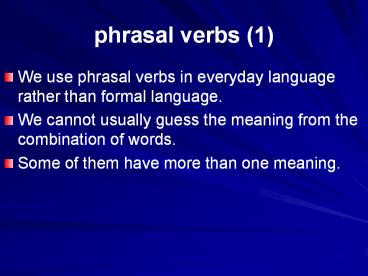phrasal verbs (1) - PowerPoint PPT Presentation
Title:
phrasal verbs (1)
Description:
Title: PowerPoint Presentation Last modified by: jjonestemp Created Date: 1/1/1601 12:00:00 AM Document presentation format: On-screen Show Other titles – PowerPoint PPT presentation
Number of Views:286
Avg rating:3.0/5.0
Title: phrasal verbs (1)
1
phrasal verbs (1)
- We use phrasal verbs in everyday language rather
than formal language. - We cannot usually guess the meaning from the
combination of words. - Some of them have more than one meaning.
2
two part verbs unsplittable
- verb preposition
- We cannot put the object between the verb and
preposition. We can sometimes guess the meaning.
3
- I came across this word in a magazine. (find by
chance) - What are you getting at exactly? (suggest)
- I won't stand for this behaviour any longer!
(tolerate) - It took me a long time to get over my illness.
(recover from)
4
- The police are looking into the robbery
(investigate) - Will you look after the baby? (take care of)
- Anna takes after her mother. (Iooks or behave
like) - I ran into Tom the other day (meet by accident)
- Tom is heading for trouble. (go in the direction
of) - When I laughed, everyone joined in. (do the same
activity) - Let's run through the details. (explain)
5
two part verbs splittable
- verb adverb particle
- We can put the object between the verb and
particle, or after the particle. If the object is
a large number of words we put it after the
particle. If the object is a pronoun e.g. me, it,
him, we put it between the verb and the particle.
We can sometimes guess the meaning.
6
- Try to carry out a 'task analysis'.
- Can you give in your homework now
- Can you fill in this form?
- You can leave out / miss out the next exercise.
- We're trying to sort out the problem.
- You can work out the answer for homework.
- Don 't forget to turn oft the lights.
- (do a piece of work)
- (give it to the teacher)
- (write information on it)
- (don't do it)
- (deal with)
- (find the solution)
- (stop using)
7
- We have put oft the match until next week.
- The bus dropped oft the students outside the
school. - Out teacher told us oft because we were noisy
- Don't let down the team, will you!
- We'll come and pick up the others at 6.00.
- Susan brought up three orphan children.
- People say it's hard to give up smoking.
- You have to look up these words.
- (postponed)
- (take to a place)
- (criticize angrily)
- (disappoint by not doing what was promised)
- (collect in a car)
- (Iook after a child until it becomes an adult)
- (stop doing something)
- (find in a dictionary)
8
phrasal verbs (2)
- two-part verbs no object
- verb adverb particle
- These verbs do not have an object (intransitive).
9
- The traffic builds up here every day
- My car has broken down again.
- It's important to speak out.
- What exactly is going on?
- The feeling of shock gradually wore off.
- Stop showing off!
- Jim always turns up late.
- Everything turned out all right in the end.
- (increase)
- (stop working)
- (be frank, give an opinion)
- (happen)
- (go away)
- (behave to attract attention)
- (arrive, often unexpectedly)
- (have a particular result)
10
three-part verbs unsplittable
- verb adverb particle preposition
- The object always comes after the preposition
11
- Have you come up with any ideas yet?
- When are you going to get round to your work?
- We've come up against a problem.
- She didn't get away with cheating in the exam.
- Maria has gone down with a bad cold.
- I can't put up with Alan! He annoys me!
- We want to do away with school uniform.
- I'm really looking forward to seeing you.
- (think of)
- (finally do something)
- (met a difficulty)
- (escape capture or detection)
- (become ill with a disease etc)
- (accept something / someone unpleasant)
- (abolish)
- (think with pleasure about the future)
12
verb adverb particle preposition object or
verb particle (no object)
- We've run out of milk again. The milk has run
out. - (have none left)
- III catch up with you later. Anna can't catch
up. - (go faster to reach someone)
- Do you get on with / along with David? Do you two
get along? - (have a good relationship with)
- I can't keep up with the class. I'm finding it
hard to keep up. - (go at the same speed as)































